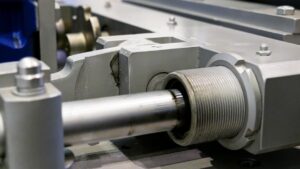Half of Germany’s mechanical and plant engineering companies are restructuring or planning to do so, with many considering site relocations and job cuts. A new study highlights the key factors behind Germany’s manufacturing crisis—geopolitical instability, rising costs, and a shrinking labor market—while companies push for better business conditions.
A quarter (26%) of machinery and plant manufacturers are currently undergoing restructuring, with a further quarter (24%) planning to do so in the short to medium term. A high proportion of those planning to restructure are considering fundamental changes: 58% want to strategically realign their business, 42% each want to relocate sites and reduce staff and one in four are planning to reduce production and service capacities. This is the result of a survey conducted by the market research institute Verian (previously: Kantar Public) on behalf of the management consultancy FTI-Andersch.
Among those who have already started restructuring, 31% are already reducing staff and 23% are cutting their production capacities. Only eight percent have actively started to relocate. One reason for the discrepancy between planning and implementation: in addition to the shortage of labor and skilled workers, 70 percent named geopolitical instability as the biggest challenge for their industry. In comparison: across all industrial sectors surveyed (automotive, mechanical and plant engineering, consumer goods), geopolitical instability only came in sixth place.

“This data not only reveals the mood, but also shows what concrete plans the companies surveyed are pursuing and where they are already taking action,” says Karsten Schulze, CEO of FTI-Andersch, the consulting unit of FTI Consulting in Germany that specializes in restructuring, business transformation and transactions. “They underline the significantly reduced attractiveness of Germany as a business location and at the same time show that the previous export-oriented economic model has reached its limits. Minorities are still cutting jobs, planning relocations and removing capacities from the market. However, these minorities are so significant that they will have a considerable impact on our economy and the players in it.”
Companies are preparing for insolvencies in Germany

40% of the companies surveyed say that they are seeing (significantly) more frequent insolvencies in their sector, with 14% even expecting a ‘wave of insolvencies’. Accordingly, 43% are preparing for the loss of significant sales volumes from insolvent customers and 29% expect supply chains to break down. This is why four out of five (80 percent) of the machine and plant manufacturers surveyed want to tap into new markets, while 58 percent want to expand their customer base outside their current target industries.
“If the geopolitical situation were not so uncertain, more machine and plant manufacturers would probably have already started relocating,” says Karsten Schulze. “However, many are aware that the situation could be complex and that they still have to act. Once the decision to plan relocations has been made, they have a high chance of being implemented. And once the relocation has taken place, the respective capacities will not return for years, as these investments must first be amortized. It is also questionable whether the attractiveness of the location will improve again in a few years’ time.”
Germany as a business location needs new framework conditions

Machine and plant manufacturers cite location policy as the main challenge for their business: Lack of labor and skilled workers (70 percent), bureaucracy (68 percent), energy prices (64 percent) and general factors for competitiveness such as infrastructure (58 percent). By 2030, 28% of respondents will lose more than 20% of their workforce. One in four (27%) machine and plant manufacturers state that they will probably be able to replace less than half of their retiring employees.
“The fact that some companies are now taking such radical action is understandable and absolutely necessary from a business perspective,” says Karsten Schulze. “At the same time, it should not be forgotten that machine and plant manufacturers in particular are medium-sized and family-run and therefore have strong personal ties to Germany as a business location. It is therefore all the more significant that this sector also expects to be more successful in other locations to such a high degree today.”
Karsten Schulze: “Entrepreneurs and management must base their decisions exclusively on the well-being of their own company and its stakeholders. At the same time, we keep hearing from companies that they want to remain loyal to their location because of their roots. However, politicians must now quickly set a new framework to make Germany attractive for investment again. Otherwise, we will no longer see a minority in the next surveys, but a majority that is downsizing, relocating and shrinking individually in order to maintain its competitiveness.”
About the study:
The market research company Verian (formerly: Kantar Public) was commissioned by the management consultancy FTI-Andersch to conduct a telephone survey of 200 companies in Germany from the automotive, mechanical and plant engineering, consumer goods and retail sectors as part of the ‘German Economic Pulse’ study on current issues surrounding the economic outlook, restructuring, insolvencies, refinancing and other structural challenges. The companies have a turnover of at least 50 million euros. Around a quarter of the companies surveyed generate more than 500 million euros per year.
Please also read the following articles:





